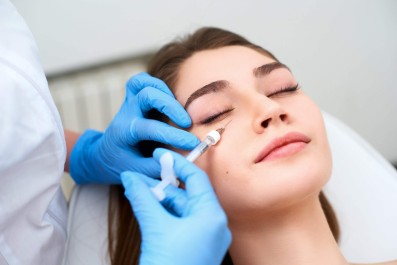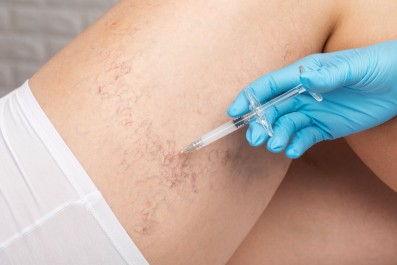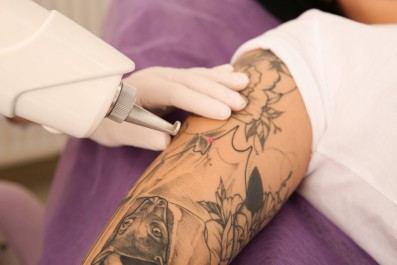Laser Hair Reduction & Darker Skin
If you are a client at the National Laser Institute Med Spa, you already know safety is our number one priority. From your initial call right through to your follow up appointment, our client services representatives, laser technicians, nurses, and physicians are guiding you through every step of your treatment plan to ensure you safely get your dream results.
The first two questions our client services representatives ask when you call the National Laser Institute Med Spa are, “What is your ethnicity?” and “Have you had any recent sun exposure?” The reason we ask these questions is for your safety. We need to determine which treatments are best for your skin type to ensure the optimal treatment plan for the best results and the highest level of safety.

Laser Hair Reduction & Darker Skin
Melanin in the skin matters when it comes to laser treatments. In our blog today, we’ll show you why skin color matters when it comes to one of our most popular laser treatments: laser hair reduction.
Why Does Skin Color Matter When It Comes To Laser Hair Reduction & Darker Skin?
The biology of skin color diversity is fascinating. Researchers have many competing hypotheses about what sort of natural selection caused dark skin to evolve. Some theories suggest that our common ancestors had light skin with thick dark hair. Over time, our ancestors skin darkened to prevent Ultra Violet (UV) injury to the cells. Then as some migrated north, their skin lightened to increase capture of vitamin D. According to research conducted by the University of California Museum of Paleontology with support provided by the National Science Foundation and the Howard Hughes Medical Institute, “as modern humans fanned out across the globe, they experienced a wide variety of environments that favored many different skin tones. Today, we see evidence of this complex evolutionary history in both our genes and our unique appearances.”
These assumptions of human evolution may explain the reasons behind the differences in skin color between different races. It has also been assumed skin color differences are due to increased melanin production in some ethnicities. Increased melanin production may also be a response to UV light. In summary, human beings have different skin colors because we have different amounts and kinds of the pigment melanin in our skin.
Categorization of skin color for medical purposes is by the Fitzpatrick scale. The Fitzpatrick scale is a chart used to classify skin color. Skin types are categorized I through VI, where type I is described as pale-white skin that always burns, and VI is dark brown to black skin that never burns. Laser technicians use the Fitzpatrick Scale to qualify candidates for laser hair reduction. The scale is used to determine if the benefits of a laser treatment will outweigh the risks to a specific skin tone.
The Fitzpatrick Scale
Skin Type I is very white and/or freckled. This skin type always burns and never tans when exposed to the sun. Genetics tend to be Scandinavian, Nordic and Northern European.
Skin Type II is white. This skin type usually burns when exposed to the sun and then develops a tan. Genetics tend to be Northern European and Celtic.
Skin Type III is white to olive. This skin type sometimes burns and sometimes tans when exposed to the sun. They are usually from Southern Europe.
Skin Type IV is brown. This skin type rarely burns when exposed to the sun and tans with ease. Genetics tend to be Mediterranean.
Skin Type V is dark brown. This skin type very rarely burns when exposed to the sun. Genetics tend to be Middle Eastern.
Skin Type VI is black. This skin type is deeply pigmented, tans easily and never burns when exposed to the sun. Genetics tend to be of African heritage.
In the past, laser treatments were designed to safely treat Fitzpatrick type I and II skin because of the greater contrast between hair and skin color. The combination of laser hair reduction & darker skin was not possible due to the higher amount of melanin in this skin type. Laser hair reduction treatments are designed to distinguish a contrast between the skin and hair. When the hair is detected by the laser, the light of the laser heats the pigment in the hair. This heat creates inflammation in the hair follicle which triggers the follicle to go into a state of dormancy.
A laser’s accuracy is dependent on its’ specific wavelength. Fortunately, a new laser has been designed with a longer wavelength to make in-office laser treatments safer for darker skin tones. The Nd-yag laser is safe for use on skin with higher levels of melanin and for laser hair reduction on our clients with darker skin tones. The Nd-yag laser is a long-pulsed laser that zaps the hair follicle from a deeper layer under the skin, and actually minimizes the chance of surface damage to the skin.
Choose A Laser Hair Reduction Expert With Experience
It is important to work with laser technicians, nurses, and physicians who are experts on the basic structural anatomy and physiology of the skin. For safe and effective treatments involving laser hair reduction & darker skin, it is important that your provider understand the relationship between melanin and wavelength, as melanin may interfere with the laser hair reduction treatment.
“Our laser technician are aware of the unique needs of our clients with darker skin. We exercise expert judgment in client evaluation, and consider all risks and benefits for our laser treatment plans for all skin types,” says Louis Silberman, CEO, and Founder of the National Laser Institute Med Spa.
We invite you to the National Laser Institute Med Spa, where our expert staff teach physicians, nurses and laser technicians from around the world how to perform the most advanced medical aesthetic treatments including treatments involving laser hair reduction & darker skin. Beauty insiders trust us because our expert staff teach physicians, nurses and laser technicians from around the world how to perform the most advanced injection and laser treatments.
Please call 800.982.6817 for your complimentary consultation to determine which treatment is best for your skin. Or click here to request your appointment online.









